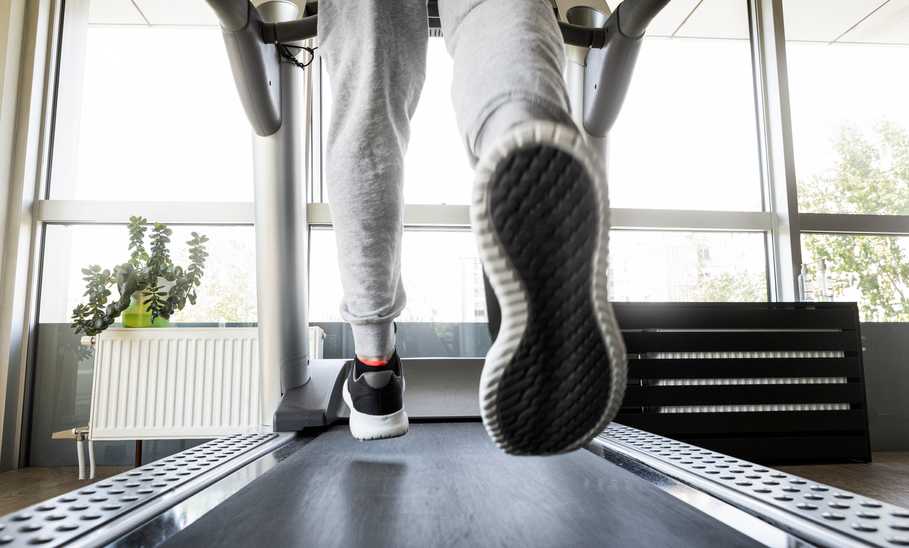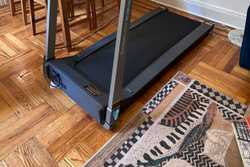- Price: $2,999
- Belt size: 20 inches (width) x 60 inches (length)
- Max speed: 12 mph
- Incline range: -3% to 12%
- Motor: 3.6 horsepower
The Best Treadmills for Runners: The Features That’ll Help You Hit a New Personal Best

Our evaluations and opinions are not influenced by our advertising relationships, but we may earn a commission from our partners’ links. This content is created by TIME Stamped, under TIME’s direction and produced in accordance with TIME’s editorial guidelines and overseen by TIME’s editorial staff. Learn more about it.
Much like the United States Postal Service, for some runners, neither snow, nor rain, nor heat, nor gloom of night can stop them from their appointed workouts. Which is why it’s handy to have a backup for bad weather days, early mornings, late nights, or any other time when hitting the streets isn’t the most practical option.
To help you jump on board, we’ve rounded up an entire gyms’ worth of treadmill options that will keep you moving.
With a 3.6 continuous horsepower motor, a roomy 60-inch by 20-inch deck and enough cushioning to make for a truly comfortable running experience, this NordicTrack pick is designed to go the distance. And with incline abilities ranging from -3% all the way up to 12% and a max speed of 12 miles per hour (a brisk five-minute mile), it’s suited for any workout you can dream up. Which brings us to one of the biggest upsides: Accessing the GoogleMaps feature, you can plot out a run on the 22-inch adjustable touchscreen—anywhere from Australia to Argentina—and the machine will automatically adjust the incline to match the terrain and even transport you there with images along the route.
![[object Object] [object Object]](https://www.soletreadmills.com/cdn/shop/files/SOLE-ST90-20230523-11019.jpg?v=1689096619&width=1200)
Consider this pick a gift to your knees. In contrast to the more common conveyer belt style, this Sole Fitness model is comprised of numerous individual slats for a smoother running surface designed to be a bit easier on your joints and help runners engage the proper muscles to maintain good form. A variety of pre-programmed workouts to choose from and a wide range of inclines allow for a customized workout experience, but the standout feature is the powerful AC motors usually only seen in commercial treadmills.
![[object Object] [object Object]](https://dks.scene7.com/is/image/GolfGalaxy/21HRZU70TSTDSRSTRTRD?qlt=70&wid=500&fmt=webp&op_sharpen=1)
A solid way to start your home treadmill journey, the Horizon Fitness 7.0 doesn’t offer its own proprietary training, but it easily connects to your tablet, allowing new runners to stream classes from Peloton, or use virtual training app Zwift. Shifting speed (up to 12 mph) and incline (up to 15%) is convenient thanks to thumb dials mounted on the handles. The sturdy frame, meanwhile, leaves runners feeling supported. Throw in a rack to hold your tablet, a rapid-charge USB charging port, and Bluetooth-connected speakers, and you’ve got a winner.
Read the full review: Horizon 7.0 AT Treadmill Review: A Solid Choice for Everyday Fitness Enthusiasts
Not as flashy as other machines (i.e. no adjustable HD TV screen), the Sole F80 is as steady as a good marathon pace. A durable, aluminum frame supports runners up to 375 pounds, while the brand swears their cushioned belt can reduce impact up to 40 percent “as compared to running on asphalt.” With speeds up to 12 mph and 15 incline levels, there’s a lot to play around with. And for those long-and-slow types logging lots of miles, there’s a spot to place an iPad and a built-in charging port.
![[object Object] [object Object]](https://www.lifespanfitness.com/cdn/shop/products/foldable-treadmill-lifespan-tr5500i_0ad232bf-7ec7-4689-ab81-feb585653d3a-sw.jpg)
Despite its smaller footprint (73 inches by 34.5 inches by 55.5 inches), the LifeSpan doesn’t skimp on features, boasting a powerful 4.0 continuous-duty horsepower motor and a sturdy steel frame that can fold away when not in use.
Other bells and whistles include 50-plus built-in workouts, making use of 13 levels of incline and two levels of decline, plus a blazing fast top speed of 13.5 mph and a 10-inch smart display-enabled touchscreen that allows you to mirror any YouTube content from your phone.
![[object Object] [object Object]](https://dks.scene7.com/is/image/GolfGalaxy/21NTKUX22NCLNTRNRTRD?wid=2000&fmt=pjpeg)
Like its sister machine, the NordicTrack x22i is designed to take you anywhere in the world thanks to its Google Maps feature, and trainer-led iFit workouts that automatically adjust your incline and speed to match the session. The difference here is that the x22i reaches a max incline of 40% and a decline of -6% to truly mimic the sorts of conditions you might encounter on the trail.
For those looking to up the ante, the console offers a push bar that can be used to mimic a weighted sled push.
![[object Object] [object Object]](https://dks.scene7.com/is/image/GolfGalaxy/22FGEUTRDVDCXXXXXTRD?wid=2000&fmt=pjpeg)
There’s a reason this brand has built a very dedicated, very committed, very vocal following. The (admittedly steep) purchase price includes a $44 per month subscription that gains you entry to Peloton’s expansive collection of live and on-demand classes. And while there are adjustable knobs, a jump button, and on-screen shortcuts designed to make it easy to switch up your speed and incline, there’s also an option to just turn the keys over to the instructor and go along for the ride. While some users note that the screen can begin to shake during more intense speeds, most rave about the expansive, adjustable 23.8-inch HD touchscreen.
![[object Object] [object Object]](https://trueformrunner.com/cdn/shop/products/Trueform-Runner-Dimension-Graphics_01800x800_455ec249-9bda-4a9a-ae79-6944c3b56420_1800x1800.gif?v=1680101945)
Much like having a trainer in your living room, Trueform’s model purports to help runners feel when they’re not using optimal form—as the belt gets easier to move when maintaining proper posture and form, making it ideal for serious runners looking to crush more intense, sprint-heavy sessions or optimize their longer distances. Fully manual, it’s powered entirely by the user’s stride and requires no motor or electricity and is designed to support up to 700 pounds 450 pounds when running at full speed.
![[object Object] [object Object]](https://www.xterrafitness.com/pub/media/amasty/webp/catalog/product/cache/99181209d3a94090409107d95ed2601f/t/r/tr150_wmodel_side_jpg.webp)
A respectable 16-inch belt width ensures runners can have a smooth run on XTERRA’s budget-friendly pick, while a 2.25 horsepower motor keeps things moving and allows for speeds up to 10 mph. Three levels of manual incline and 12 preset programs offer a decent amount of variety, while a five-inch LCD display keeps track of all necessary stats. Even better, the entire 97-pound machine can be folded up and stored away.
![[object Object] [object Object]](https://i5.walmartimages.com/seo/Sunny-Health-Fitness-Motorized-Folding-Running-Treadmill-20-Wide-Belt-Flat-Low-Profile-Portability-Speakers-USB-AUX-Audio-Connection-Strider-SF-T7718_6d206be9-dfb7-4f41-b983-149c79200930.bd5070367bf19583fb2a7e4b9bdec96b.jpeg?odnHeight=640&odnWidth=640&odnBg=FFFFFF)
When it comes to treadmills, you gotta know how to fold ‘em. And unlike most running options that fold upright, the Sunny Pro Treadmill can actually be flattened to a slim 10.5 inches, meaning it can be stored under your bed or couch.
It also packs quite a punch with nine built-in programs, Bluetooth connection to their workout-packed SunnyFit app, and a top speed of 9 mph—a respectable 6:40 mile.
We researched some of the most popular treadmill brands on the market based on reviews, speed, and incline options, motor power and ease of use. We also considered recommended factors from running experts, scoured countless reviews for additional data points to compare, and factored in personal experience as well.
Those slipping into their running clothes for workouts strictly of the walking variety will find a machine with 2.0 horsepower will get the job done. But for runners, 3.0 horsepower is recommended, says New York City running coach Elizabeth Corkum. “Considering that for a motorized treadmill, the motor is the heart of the machine, this isn’t something to skimp on.”
No, you can’t match your outdoor run stride-for-stride, but a good treadmill will offer enough speed and incline settings that you’re able to log everything from a long, hilly walk to a series of intense sprint intervals. Some smaller treadmills will top out at 10 mph, though, and while a six-minute mile is quick enough for most recreational runners, if you have a need for lots of speed, you’ll want a pick that reaches up to 13.5 mph.
When you’re attempting sprint repeats on a treadmill, you don’t want to be fumbling around to find the right keys. The ideal treadmill will have a simple-to-understand user interface that lets you just hop on and hit the road.
The key here is to find a belt large enough to support a standard running gait — ideally at least 20 inches wide and 60 inches long. Cushioning is important, too, particularly if you’ll be logging quite a few miles. Belts with more cushioning help absorb some of the impact and protect your joints and spine.
If you’re the type to simply hit the quick start button, a basic machine will do. But if you’re hoping to stream workouts, consider an option with a built-in screen or place to put a tablet, and other features like a USB charging port and Bluetooth speakers.
If you’re the running type, you’ll need a machine that offers both a shock-absorbing cushion, a wider and longer belt to accommodate your stride, and a large range of speed and incline options that allow you to mix up each session. If you’re a self-starter, you can probably opt for a more bare-bones model, but if you’re in search of some guidance, seek machines that offer preset programs, or an option to connect to streaming and on-demand workouts.
To comfortably run without fear of knocking your head on the ceiling, you’ll want to ensure you have a clearance at least 15 inches above your height. You’ll also want to keep the area behind your treadmill clear. And if you plan to run above a bedroom—or another apartment—consider springing for a treadmill mat that will help dampen some of the noise.
Safety is also an important consideration. Your treadmill should be in a place that is not accessible to pets and children.
Bogging down a circuit with your treadmill plus other appliances, could lead to an overload and frustrating shutdowns.
“You can use it 24/7, no matter the weather or safety due to daylight,” explains New York City running coach Elizabeth Corkum of the allure of a treadmill. And no excuses not to lace up those running shoes means no reason to stray off course from your fitness goals, she notes: “Having a path of least resistance can be key in training consistency.”
When you have the option to knock out a run at any time of day in any type of weather, it’s harder to put off training. However, Corkum adds, “Having a treadmill in a space that doesn’t feel designated for training may mean the machine won’t be used. There’s something sacred about going to the gym and eliminating chores and distractions that are always at home.” That’s why she suggests carefully cultivating your fitness space: “Creating a home gym that feels supportive, fun, and shuts out the rest of the house is often the key to using the machine.”
As with anything, there are pros and cons to each. In addition to providing a controlled, no excuses environment, treadmills “can be fantastic for specific workouts like intervals or mile repeats at a specific space,” says Corkum. Though, she notes, long, slow runs can feel especially tedious indoors.
Running outside, meanwhile, can provide the sort of variety necessary for your mind and your body, forcing you to adjust to different terrain, elevation, and all types of weather which, notes the coach, “is necessary if you plan to race.”
If you plan to use the machine mainly for runs, you don’t want to skimp. “Runners will notice the quality of a treadmill over a walker,” says Corkum, “as the high-impact nature of running will simply require a better piece of equipment.” While walkers can use a motor with just 2.0 horsepower, runners will want to seek out an option with at least 3.0.
Not if you’re doing it properly, says Corkum. “When outside, we naturally adjust our form and muscle recruitment and usage for terrain,” she notes. “On a treadmill, those external variables are eliminated, so adding in variety is important.” In other words, make the incline button your friend.
Other mistakes to look out for: Running too close to the console (“This will impact hips, core and arm swing,” notes Corkum), overstriding (“Toes should not be going over the front of the treadmill belt,”) and building a bad habit of “under-utilizing the posterior chain, specifically the hamstrings,” she says, “because the belt moves.”
Yep, they’re just like the rest of us. “They pick and choose how and when to use the treadmill,” says Corkum, “often due to weather, location, what they feel like doing, and what they may have done the day before or have on their training calendar the following day.”
We promise you can feel every bit as drenched with sweat and out of breath as you do on pavement. “Running is running and walking is walking — it doesn’t matter where or how you do it!” stresses Corkum. Though, she notes, you may need to play around with your pace, “as often, treadmill runs feel harder or easier than outside for a slew of reasons.”
That depends on your definition of the word better. Curved treadmills don’t require electricity and can often be more cost-effective than motorized machines, says Corkum. But while they’re, “ideal for short and fast intervals,” she says, they’re not as great for a long walk or run.
The information presented here is created by TIME Stamped and overseen by TIME editorial staff. To learn more, see our About Us page.



